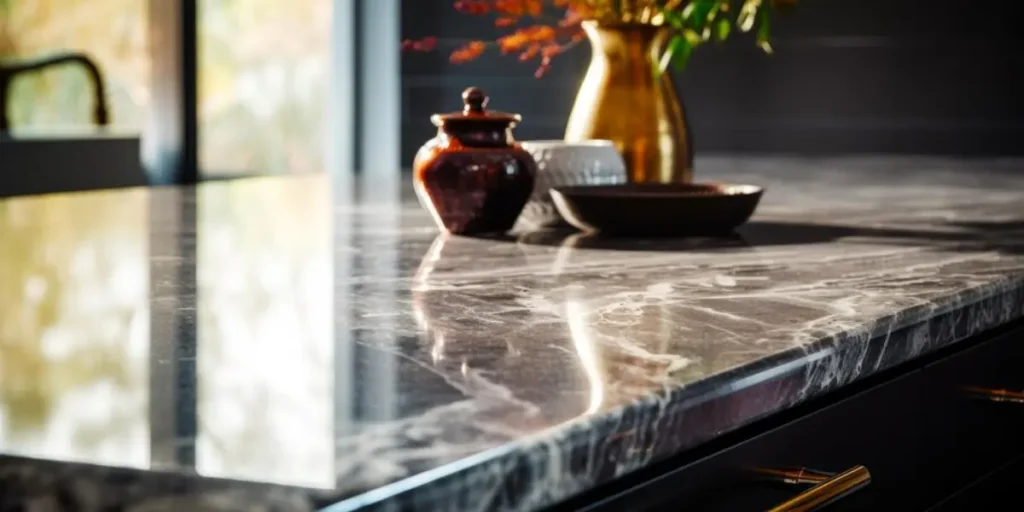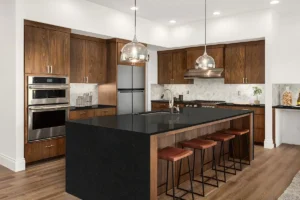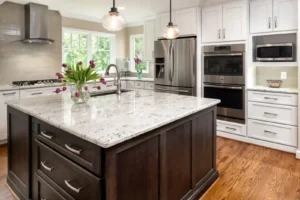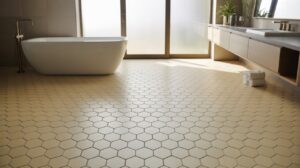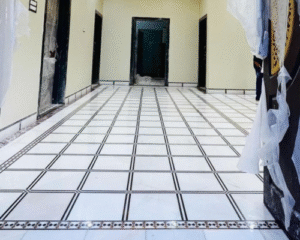In today’s guide, we delve into the allure of soapstone countertops for kitchens, exploring their unique characteristics, benefits, and considerations. Whether you’re renovating your kitchen or considering upgrading your countertops, understanding the features of soapstone and how they compare to other materials like quartz is essential. At SF Marble And Granite Inc, we specialize in transforming kitchen spaces with premium natural stone solutions. With years of experience and a commitment to quality craftsmanship, we offer a diverse range of soapstone options to suit every style and budget. Discover the elegance of soapstone and let us help you enhance your kitchen with our expertise and personalized service.
What Is Soapstone Countertops?
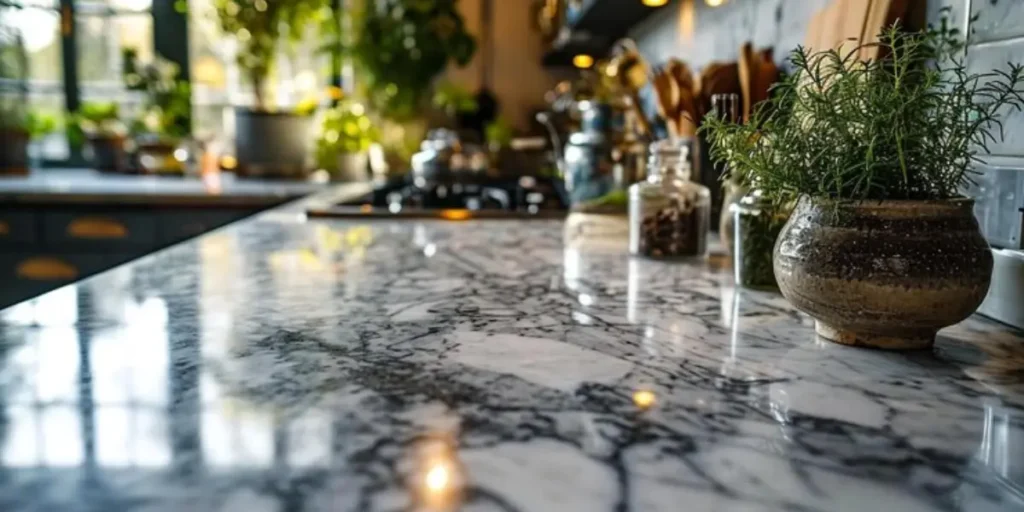
It is a type of natural stone surface used primarily in kitchens and bathrooms. Soapstone, also known as steatite, is a metamorphic rock composed mainly of talc, with varying amounts of other minerals like magnesite, chlorite, and dolomite. Its unique properties make it a popular choice for countertops:
Table of Contents
ToggleAppearance
Soapstone typically comes in shades of gray, ranging from light to dark. It often features subtle veins that add character and depth to the stone.
Durability
While softer than granite or quartz, soapstone is still quite durable and can withstand daily wear and tear. It is heat-resistant and less prone to cracking or chipping.
Maintenance
Soapstone is relatively low-maintenance compared to other stones. It does not require sealing and can be cleaned with mild soap and water.
It offer a timeless elegance and a smooth, matte finish that adds warmth to any kitchen or bathroom space.
Soapstone countertops pros and cons
Pros of Soapstone Countertops
- Natural Beauty: Soapstone boasts a unique, natural appearance with a smooth, matte finish that develops a beautiful patina over time.
- Heat Resistance: It is highly heat-resistant, making it ideal for soapstone kitchen countertops installation where hot pots and pans are frequently used.
- Stain Resistance: Soapstone is naturally resistant to stains and doesn’t require sealing like some other countertop materials.
- Durability: While softer than granite, soapstone is still durable and less prone to cracking or chipping.
Cons of Soapstone Countertops
- Susceptibility to Scratches: Soapstone can scratch easily, although minor scratches can often be sanded or oiled away.
- Limited Color Options: Soapstone typically comes in shades of grey soapstone countertops, so if you prefer a wider range of colors, other materials like granite or quartz may be more suitable.
- Requires Oiling: Periodic oiling is recommended to maintain soapstone’s appearance and enhance its natural color and veining.
Considering these pros and cons can help you decide if they are the right choice for your home and lifestyle.
Soapstone Countertops vs Quartz
When deciding between soapstone countertops vs quartz countertops, there are several factors to consider based on your preferences and needs for your kitchen or bathroom surfaces.
Soapstone Countertops
- Appearance: Soapstone has a unique, natural look with a smooth, matte finish. It typically comes in shades of gray and develops a patina over time.
- Heat Resistance: Soapstone is highly heat-resistant, making it ideal for kitchens where hot pots and pans are frequently used.
- Stain Resistance: Soapstone is naturally resistant to stains and doesn’t require sealing like some other countertop materials.
- Maintenance: Soapstone requires periodic oiling to maintain its appearance and enhance its color and veining. It can scratch easily but minor scratches can often be sanded or oiled away.
Quartz Countertops
- Appearance: Quartz countertops are engineered stone surfaces made from quartz crystals and resins. They come in a wide range of colors and patterns, mimicking the appearance of natural stone like marble or granite.
- Durability: Quartz is one of the hardest minerals and is highly durable. It is less likely to scratch or chip compared to soapstone.
- Stain Resistance: Quartz is non-porous and highly resistant to stains, making it easier to maintain without sealing.
- Maintenance: Quartz countertops are low-maintenance and do not require sealing or special treatments like soapstone.
In summary, if you prefer a natural, unique appearance with heat resistance and don’t mind occasional maintenance, soapstone can be a great choice.
Choosing the Right Soapstone for Your Kitchen
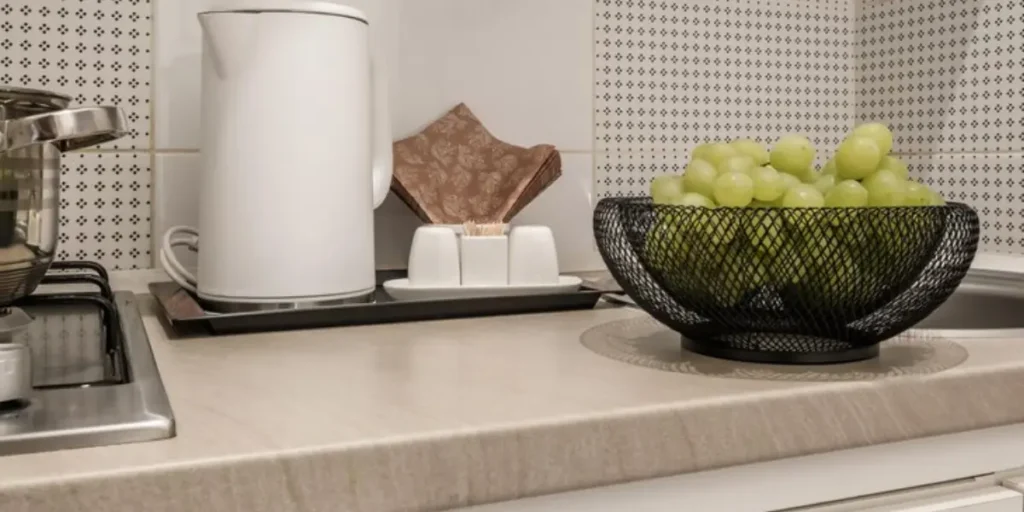
Choosing the right soapstone for your kitchen involves considering various factors to ensure it aligns with your design preferences and practical needs. Here are key aspects to keep in mind:
Color and Veining
- Shade Variation: Soapstone typically comes in shades of gray, ranging from light to dark. Choose a hue that complements your kitchen’s color scheme.
- Veining: Some soapstone varieties feature beautiful veins and patterns. Decide if you prefer subtle veining or more pronounced patterns.
Finish Options
- Natural Matte Finish: Most soapstone countertops white have a natural matte finish that develops a patina over time.
- Polished Finish: For a sleeker look, consider a polished finish, although this may require more maintenance to preserve the shine.
Thickness and Edge Profiles
- Thickness: They are available in various thicknesses. Thicker slabs can provide a more substantial appearance.
- Edge Profiles: Choose an edge profile that complements your kitchen’s style, such as straight, beveled, or bullnose edges.
Matching with Cabinetry and Décor
- Contrast or Harmony: Decide if you want the soapstone to contrast with your cabinetry or blend harmoniously with the overall design.
- Cabinetry Color: Consider soapstone countertops white cabinets colors, such as white soapstone countertops, dark wood, or painted finishes.
Practical Considerations
- Durability: While soapstone is durable, it can scratch easily. Determine if you’re comfortable with the natural patina that develops over time.
- Maintenance: Understand the maintenance requirements, such as periodic oiling, and consider if it fits with your lifestyle.
By considering these factors and consulting with experts, you can select the right soapstone for your kitchen that enhances its aesthetic appeal and functionality.
Soapstone Countertops Colors and Styles
It come in a range of colors and styles, each offering a unique look and feel to complement different kitchen designs. Here are popular colors and styles to consider:
Colors
- Classic Gray: The most common color, ranging from light gray soapstone countertops to deep charcoal. Gray soapstone countertops pairs well with various cabinet colors and kitchen styles.
- Green Tones: Some soapstone varieties exhibit green soapstone countertops hues due to chlorite mineral content. These countertops add a touch of natural earthiness to the kitchen.
- Black: Dark charcoal or black soapstone countertops create a striking and sophisticated look, ideal for modern and contemporary Soapstone Kitchen Countertop designs.
Styles
- Natural Matte Finish: Most countertops feature a natural matte finish that develops a patina over time, enhancing the stone’s character and beauty.
- Polished Finish: For a sleeker appearance, soapstone can be polished to a smooth and shiny finish. However, keep in mind that polished soapstone may require more maintenance to preserve its luster.
- Veining and Patterns: Soapstone often exhibits unique veining and patterns, adding visual interest to the countertops. Choose a style with veins that complement your kitchen’s aesthetic.
Conclusion
In conclusion, choosing countertops for your kitchen can be a rewarding decision, offering timeless beauty, durability, and unique characteristics. By understanding the pros and cons, as well as comparing soapstone to other materials like quartz, you can make an informed choice that suits your lifestyle and design preferences. Whether you prefer the natural elegance of soapstone’s matte finish or the versatility of quartz, SF Marble And Granite Inc is here to guide you through the selection process and provide expert installation services.
Enhance Your Kitchen with Premium Granite Countertops
At SF Marble & Granite Inc., we bring over a decade of experience to every project. Our hand-selected range of premium light granite countertops is crafted to elevate your kitchen’s look and performance. Whether your style leans toward modern minimalism or traditional elegance, our expertise ensures a perfect match to your décor. For quality craftsmanship and reliable service, explore our professional Countertops Installation in Lowell options. Let us help you transform your kitchen into a warm, inviting space you’ll love for years to come.
Contact SF Marble And Granite Inc
For personalized assistance with choosing soapstone countertops or any other natural stone surfaces, reach out to SF Marble And Granite Inc. Visit our showroom at 755 Dutton St., Lowell, MA 01851, or contact us via email at sfmarbleandgranite@gmail.com or phone at 978-459-5821. Our team of professionals is dedicated to helping you transform your kitchen with quality craftsmanship and exceptional service. Enhance your home with the timeless beauty of soapstone — contact us today!
FAQs
Are soapstones available in white?
Yes, white soapstone countertops can come in shades of dark or light gray. While white soapstone is less common than gray or black, it can add a clean and elegant look to your kitchen.
How can I maintain black soapstone countertops?
Black soapstone require regular cleaning with mild soap and water. Minor scratches or marks can often be concealed with mineral oil or sanding.
Do green soapstone countertops change color over time?
Yes, green soapstone countertops may develop a deeper color and richer patina over time, which enhances their natural beauty.
Are grey soapstone countertops prone to staining?
Soapstone is naturally stain-resistant, including gray varieties. However, it’s still recommended to clean up spills promptly to maintain the stone’s appearance.
What is the difference between light gray and dark gray soapstone countertops?
Light gray soapstone countertops have a softer and lighter appearance, while dark gray soapstone offers a more dramatic and bold look. Both options provide a classic and timeless aesthetic for your kitchen.

